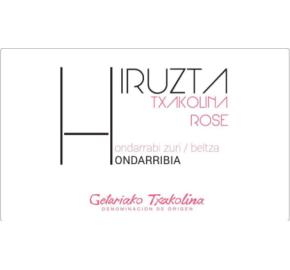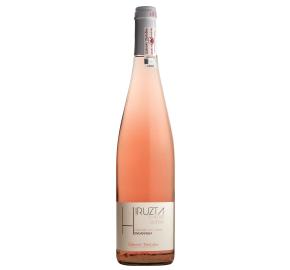Hiruzta - Hondarrabi Zuri Beltza - Getariako Txakolina 2023
Log in to view pricing and order online
Don't have an account? Register here
Item# 97166-23
Vinous Media
90pt
Food pairing
Appetisers, hors d’oeuvres, mild and semi-cured cheeses, shellfish, fish, rice, pulses, pasta, cold meats and white meat. Serving temperature: 8 degrees to 10 degrees Celsius. Store in a well-ventilated cool dark place. Good development in the bottle for up to two years.
Grapes
Is a modern rose Txakoli made from the Hondarrabi Zuri and Hondarrabi Beltz grapes grown at the winery's own vineyards in Hondarribia.
Tasting notes
Redcurrant-pink colour with rich aromas of red and black fruits, such as strawberries, blackberries and black currants, over a citrus background and fine vegetal notes. Very fresh in the mouth with a balanced acidity accentuated by a hint of carbonic gas, offering a pleasing palate and a long, aromatic finish.
Varietals
60% Hondarrabi Beltza. 40% Hondarrabi Zuri.
Vineyard
The winery's own 11 ha. vineyard is located in the surroundings of the winery itself, at the foothills of Jaizkibel Mountain. It is oriented towards the mid-day sun which protects it from the wind and damp of the nearby Cantabrian sea, thereby enjoying excellent sunshine. Trellis grown vineyard using double Guyot training system. Plantation layout: 2.60 x 1.20 (3,200 strains/hectare). Soil with a thick bedrock layer and clayish marly.
Vinification
Grapes selected for harvesting at the winery's Hondarrabi Beltza and Hondarribia Zuri vineyards, picked and transported in small crates. Destemming and crushing. Maceration in tank for 4 to 6 hours at
a temperature of 8degrees to 10degrees Celsius, followed by straining or bleeding (saignee) of the pink must. This pink must was subsequently mixed with the Hondarrabi Zuri white must. Once free from impurities the musts were fermented at a controlled temperature of between 16 and 18degrees C. Gentle clarification and stabilisation. Sterile bottling via amicrobic filtration.
Vintage
It began with a spring with higher average temperatures than in recent years, and much drier than usual. This lead to the budding and flowering occurring almost one month in advance, such as the settling,
which was at the beginning of June, approximately a month earlier than usual. Because summer was not very hot and there were many cloudy days, ripening was delayed and harvesting took place on the usual dates. This is a good vintage in terms of quality and quantity.


